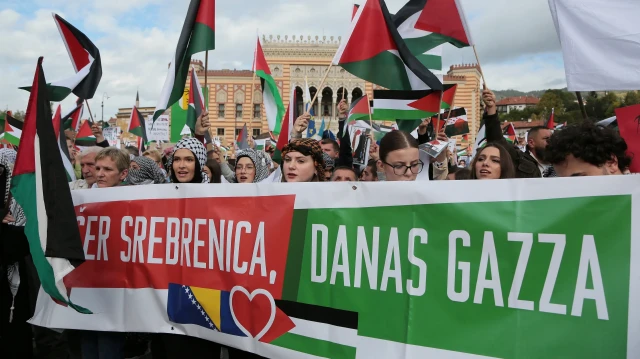Recognition Without Ceasefire: Bosnia’s Lesson for Palestine

By Nafisa Latic
Reklam yükleniyor...
Reklam yükleniyor...
Sarajevo was already under siege, with daily shelling by Bosnian Serb forces led by Ratko Mladić, when the European Union and the United States recognized the independence of Bosnia and Herzegovina after the breakup of Yugoslavia. Bosnia formally gained UN membership on May 22, 1992, at a time when war was raging, ethnic cleansing was underway, and vast swaths of its territory were occupied. This move gave Bosnia formal legitimacy and opened the door to later international engagement and prosecution of war crimes. But it did not change the situation on the ground and prevent genocide.
Recognition introduced Bosnia into the international system and opened institutional channels such as diplomacy, UN mechanisms, and global conventions. Admission to the UN is a prerequisite for meaningful international action and protection. In Bosnia’s case, recognition enabled access to aid, peacekeeping missions, and international justice, including war crimes prosecutions. Unlike Palestine, Bosnia had U.S. administration support, led by President Bill Clinton, who after long negotiations brokered a peace deal in 1995. The accord was signed too late — a couple of months after Bosnian Serbs butchered more than 8,000 Muslim men and boys in Srebrenica, and international experts flew in to dig out body parts from hundreds of mass graves. Hundreds remain unidentified three decades later. Bosnia never recovered from its bloody past.
This week, despite U.S. and Israeli objections, and amid war and genocide in Gaza, several major powers recognized the State of Palestine, with officials expressing hope that their decision will help a population starved, bombarded, and displaced in full view of the world for nearly two years. These moves strengthen Palestine’s political and moral standing globally, paving the way for opening diplomatic missions and making use of international institutions. But formal UN membership requires a Security Council recommendation where powers such as the U.S. hold veto power. It does seem that when the international community is unable to stop the bloodshed, it turns to the question of recognition. In Palestine’s case, world powers have been unable to put enough pressure on Israeli Prime Minister Benjamin Netanyahu to sign a ceasefire deal. No matter what they offer, Israel appears determined to pursue its agenda — and after killing more than 50,000 people, to ethnically cleanse the territory and force Palestinians who survived snipers and starvation from their homes.
Bosnia was admitted to the UN while inheriting the formal state framework of the former Yugoslavia. Palestine has been recognized by more than 130 countries, and today’s recognitions serve less as legal formalities and more as geopolitical signals by Western governments directed at Israel’s policies, meant to breathe new life into the two-state solution.
The practical implications also diverge. For Bosnia, UN membership accelerated institutional state-building under international oversight and peacekeeping forces. For Palestine, recognition increases political pressure but does not address occupation, borders, or enforcement of international law without broader consensus and a shift in power dynamics on the ground. All this will still need to be addressed once a ceasefire is finally reached.
Still, the decision by the UK, Canada, and Australia is historic and symbolically powerful. It boosts Palestine’s legitimacy, offers diplomatic leverage, and leaves Israel and the U.S. looking more isolated than ever. Yet, as Bosnia’s case reminds us, recognition is only a beginning, not an end. True statehood requires functioning institutions, security, control over territory, and international guarantees of rights. Without those practical foundations, recognition risks remaining a political milestone with limited effect on real sovereignty.
Today, as Britain, Canada, and Australia formally recognize the State of Palestine, we witness a diplomatic moment heavy with history but bounded by reality. State recognition is a moral and political signal: confirmation of identity, a restoration of hope for millions seeking their own homeland, and a new channel for international protection of rights.
But Bosnia’s experience teaches a sobering lesson: recognition is necessary, but never sufficient to stop the killing before it is too late. Bosnia gained a UN seat and international backing, yet war trauma, internal divisions, and the slow building of institutions made recovery a drawn-out process. Palestinians may one day gain legitimacy and access to diplomacy, but without real change on the ground, without secure borders, and without a functional state that controls its own space, recognition will remain a powerful symbol but not a guarantee of freedom.
The real test comes after the words. Will the international community find a way to secure a ceasefire in Gaza and finally stop the killing and persecution of Palestinians? Or will recognition remain a hollow declaration that fails to address the core issues of genocide, occupation, and displacement? If these recognitions are genuine, they must be followed by concrete actions. Only then can recognition mark the beginning of the end of uncertainty, rather than just another page in the diplomatic record. Palestinians don’t have any time left, and hopefully this strong diplomatic push by Western powers will bear fruit.
Reklam yükleniyor...
Reklam yükleniyor...







Comments you share on our site are a valuable resource for other users. Please be respectful of different opinions and other users. Avoid using rude, aggressive, derogatory, or discriminatory language.